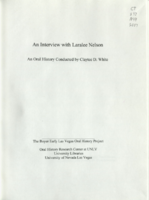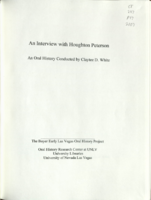Search the Special Collections and Archives Portal
Search Results

Qiong Liu interview, June 8, 2016: transcript
Date
Archival Collection
Description
Interviewed by Claytee White. Dr. Liu is the City Manager for the City of North Las Vegas. Discusses housing, diversifying the economy, Apex, Faraday and negotiations to secure that business for North LV.
Text

Transcript of interview with Nancy Cummings-Schmidt by Stefani Evans and Claytee D. White, October 18, 2016
Date
Archival Collection
Description
With the explosive growth of the Las Vegas Valley over the past 30 years, it is rare to find someone who has deep battle born roots that go back to the early mining days of Nevada. Nancy Cummings-Schmidt is an example of that rare kind of gem. As a fourth generation Nevadan, her family came to the state in the 1800s form Ireland and England. Looking to capitalize off of the mining boom in Virginia City, they transitioned to ranching. She spent her first years in Reno and when her father went off to fight in the Second World War, her mother moved to Herlong, California and sent her to live with her grandparents. Upon moving to Vegas for fourth grade, her mother remarried and worked for the Las Vegas Sun while Nancy attended the Fifth Street Grammar School and later became a member Las Vegas High School’s first graduating class in 1956. After graduating from high school, Nancy invested in the spirit of wanderlust as it carried her to study theatre at Texas Christian University (which sh
Text

Steve Jones and Bart Jones interview, Novermber 7, 2016: transcript
Date
Archival Collection
Description
Brothers Steve and Bart Jones live and breathe Las Vegas history. Their grandparents, Burley and Arlie Jones, arrived in Las Vegas in the nineteen-teens; their father, Herb Jones; his sister, Florence Lee Jones Cahlan, and their uncle, Cliff Jones, helped form the legal, journalistic, and water policy framework that sustains Southern Nevada today. The Jones brothers build on that foundation through their custom home-building company, Merlin Construction. In this interview, they talk about living and growing up in Las Vegas, of attending John S. Park Elementary School, of hunting in the desert, of their family's commitment to cultural and racial diversity, and of accompanying their grandfather to his business at the Ranch Market in the Westside. They share their early work experiences lifeguarding and later, dealing, at local casinos as well as second-hand memories of the Kefauver trials through the tales told by their father and uncle. Steve describes mentor Audie Coker; he explains
Text

Ray D. Merrill interview, March 14, 1978: transcript
Date
Archival Collection
Description
On March 14, 1978, collector Rick Merrill interviewed his father Ray Merrill (born May 22nd, 1933 in Wynona, Oklahoma) about living in Southern Nevada. In this interview, Mr. Merrill speaks extensively about working while growing up in Las Vegas, Nevada. From eleven years old on, he worked as a paperboy, shoe shiner, and grocery store clerk, among other jobs. He also talks about being a student at Las Vegas High School and what he and others did for recreation. The discussion also includes the history of hospitals in Las Vegas as well as what doctors’ offices were like.
Text

Transcript of interview with Owen Earl Cox by Mark Milford, March 6, 1981
Date
Archival Collection
Description
On March 6, 1981, Mark Milford interviewed Owen Earl Cox (born 1909 in Bunkerville, Nevada) about his experiences growing up in and working in Nevada. Cox first talks about his early moves to and from Nevada and his work in road construction in the 1930s. He then discusses his work of machinery at the Basic Magnesium Plant and some of his experiences during that time. Cox also talks about his family, the Mormon Church, the growth of population, and the increase in tourism. He later describes managing a store he owned known as Vegas Village and the types and prices of the products that were sold there. The end of the interview involves a discussion of crime, Cox’s hobby of cattle ranching, and his views on the growth of Las Vegas.
Text

Transcript of interview with Laralee Nelson by Claytee White, April 20, 2010
Date
Archival Collection
Description
Laralee Nelson and her four sisters were born and raised in Provo, Utah. She was raised in a Mormon household, her parents worked at Brigham Young University and she attended BYU She was .nearly thirty years old when she moved to Las Vegas with her husband. The move was the first real move away from her Utah home base. She fondly recalls summers at an archaeological dig in Israel while studying for her undergraduate degree. But these were nothing compared to relocating to Las Vegas. Laralee's mother was a librarian at BYU and an obvious inspiration to her career choice. Once she arrived in Las Vegas, she applied for a cataloging position at UNLV. From 1982 to 2010, it was her first and only position. From that span of years, she witnessed monumental changes in the library. Changes in leadership, a move from the old Dickinson Library to the new Lied Library, and the impact of technology. Laralee's anecdotes, especially one about the professor with the red wagon and another about her father clearing a rocky path on a family trip, reveal core success of a library built to serve the university community.
Text

Transcript of interview with Houghton Hoot Peterson by Claytee White, May 20, 2010
Date
Archival Collection
Description
Houghton Hoot Peterson played trombone in his high school band in northern Minnesota where he grew up. That same instrument would lead him to be a member of the highly regarded Air Force jazz band called Airmen of Note after enlistment. Then during a short tour at Nellis Air Force base, Hoot decided that the Las Vegas entertainment scene might have career opportunities for him. He moved to Las Vegas in 1962, an era of celebrity performers and tourists who enjoyed the crowds and nightlife. Hoot's point of view was as a musician in the band, most often a Strip relief band. But he also has tales of famous musicians and late night jam sessions. Hoot's career spanned 20 years. Eventually the Las Vegas scene for live musicians began to change. When times got tough for Hoot, he worked as a carpenter and at a music store. In this interview he discusses his fascinating past and offers advice for today's musicians.
Text

Transcript of interview with Dr. Harrie Fox Hess by Scot Siegel, February 26, 1979
Date
Archival Collection
Description
On February 26th, 1979, Scot Siegel interviewed his psychology professor, Dr. Harrie Hess (born March 1, 1929 in Hammond, Indiana) in his office at the University of Nevada, Las Vegas. Dr. Hess discusses his family’s reason for moving to Nevada and how he felt as a young adult moving to Las Vegas. The two go on to talk about Dr. Hess’ contributions to Nevada through his work as a psychologist, and briefly mentions the first law to be drafted on psychology certification in Nevada. Dr. Hess then describes the Wild Cat Lair as an important site of social recreation for early Las Vegas youth. The interview concludes with his memory of Boulder (Hoover) Dam and how he believes that workers from the Great Depression paved the way for industrial success in gambling due to their employment on the Dam.
Text

Transcript of interview with Dorothy Ross Fletcher by Sharon Hildebrandt, June 26, 1975
Date
Archival Collection
Description
On June 26, 1975, Sharon Hildebrandt interviewed Dorothy Ross Fletcher (born 1936 in Las Vegas, Nevada) about growing up in and living in Southern Nevada. Fletcher first talks about that various towns in which she lived while growing up before discussing the schools she attended. She also discusses the changes in schools, her involvement in politics, church activity, gambling as a recreational activity, and prominent visitors who came to Las Vegas. Fletcher also talks about living in Nevada during World War II, the atomic testing, environmental changes and extreme weather, and the social changes in Las Vegas. The latter part of the interview involves discussion of real estate, the introduction of air conditioning for cooling, changes on the Las Vegas Strip, recreational activities available to youth in Las Vegas and the increase in the nonnative population.
Text

Joseph C. Mattingly interview, February 23, 1979: transcript
Date
Archival Collection
Description
On February 23, 1979, collector Sean Powers interviewed Joseph C. Mattingly (born April 21st, 1912 in Texas) at his home in Las Vegas, Nevada. In this interview, Mr. Mattingly discusses working construction on many buildings in the Las Vegas and Henderson areas in Nevada. He also talks about being a member of a motorcycle club and about air conditioning in the early days.
Text
